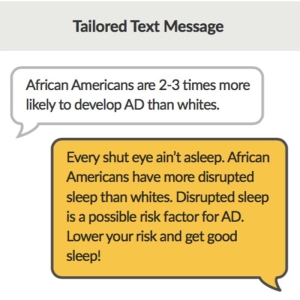Culturally Tailored Text Messages Improve Alzheimer’s Education among African Americans
December 03, 2018 / by Jenesse Miller- Research
A new USC study shows that older African Americans who received culturally tailored text messages about Alzheimer’s disease had the highest increase in Alzheimer’s disease literacy levels when compared with other participants.
Researchers say the study, published in the American Journal for Geriatric Psychiatry, shows culturally competent educational formats are an important way to reduce health disparities.
While a cure for Alzheimer’s remains elusive, experts agree that earlier diagnosis provides greater treatment and planning options — including organizing ongoing care and planning for financial and social well-being — for patients and caregivers.
Enter the BrainWorks study by Karen Lincoln, an associate professor at the USC Suzanne Dworak-Peck School of Social Work and founder of Advocates for African American Elders at the USC Edward R. Roybal Institute on Aging. The study tested an intervention that began with participants attending an hourlong “talk show” in an African-American community setting that delivered information about Alzheimer’s. The next phase incorporated a monthlong regimen of daily text messages to promote Alzheimer’s literacy — defined as knowledge about the disease and understanding of its causes, consequences, symptoms and treatment.
“Alzheimer’s education is important for everyone,” Lincoln said. “However, increasing Alzheimer’s literacy among African-Americans is crucial for increasing their awareness of their personal risk for the disease, improving care, reducing disparities and ultimately enhancing the quality of life of people diagnosed and their caregivers.”
Why focus on Alzheimer’s disease literacy?
The facts about Alzheimer’s are grim for older African-Americans. They’re two to three times as likely to have the disease or other dementias as older whites, and it’s the fourth leading cause of death among older African-American adults. Missed and delayed diagnosis of the disease and other dementias are more prevalent among African-Americans than among whites.
Lincoln’s own mother was diagnosed with moderate to severe dementia. Despite her professional expertise, it took her several years to convince her family that something was wrong. “As a result, I became a lot more passionate about educating people, and I have a lot more understanding and compassion,” Lincoln said.
Researchers say traditional methods of educating older Americans and their caregivers — print communication and the internet — are missing the mark. One in four African-Americans have below basic literacy levels and less than half of older African-Americans are internet users.
In contrast, 77 percent of older African-Americans and 92 percent of African-American adults overall own a cellphone, providing what the USC research team called a “level playing field” and the means to reach its target audience.
Poor sleep a risk factor for Alzheimer’s
USC researchers enrolled 225 African-Americans ages 45 years and over from senior centers, churches, senior residential communities and social clubs in Los Angeles. They randomly assigned participants to three different interventions and conducted pre- and post-intervention surveys to evaluate their effectiveness.
First, one group of participants received standard printed materials on Alzheimer’s and attended a 60-minute, culturally tailored talk show format event held at a large community site. Second, another group received the materials, attended the talk show and also received daily text messages designed to increase knowledge about Alzheimer’s by providing “nudges” to engage in healthy brain behaviors.
Third, a different group received the materials, attended the talk show event and received text messages that addressed the same kind of information as the general text messages but used colloquialisms, language and style that better resonated with older African-Americans.
For example, a culturally tailored message about poor sleep, one risk factor for Alzheimer’s, was worded: “Every shut eye ain’t asleep. African Americans have poorer sleep than Whites. Poor sleep is a possible risk factor for AD. Lower your risk and get good sleep!”
In another culturally tailored message designed to encourage mental stimulation, researchers substituted a suggestion in the general text messages to play Scrabble and Sudoku with a culturally tailored suggestion to play games popular in the African-American community such as bid whist, dominoes or spades.
While all three groups had measurable increases in Alzheimer’s literacy from baseline (measured by the Alzheimer’s Disease Knowledge Scale, a set of 30 true/false items), the group that received the culturally tailored text messages had the greatest increases in literacy.
“There are no other interventions I’m aware of that focus on Alzheimer’s disease literacy in African-Americans,” Lincoln said. “In addition to being culturally appropriate and tailored, it’s fairly low-tech, which is very important as we’re talking on average about a low-literate, low-computer-use population.”
Additional study authors are Tiffany W. Chow, professor of clinical neurology at the Keck School of Medicine of USC and director of clinical monitoring and diversity strategies at USC Alzheimer’s Therapeutic Research Institute, and Bryan F. Gaines, co-chair and project specialist for Advocates for African American Elders and assistant director of the Hartford Center of Excellence in Geriatric Social Work at the USC Roybal Institute.
The study was supported by a $28,500 grant from the Alzheimer’s Disease Research Center (P50-AG05142) and two grants totaling $19,400 from the Southern California Clinical and Translational Science Institute (UL1 TR001350).
To reference the work of our faculty online, we ask that you directly quote their work where possible and attribute it to "FACULTY NAME, a professor in the USC Suzanne Dworak-Peck School of Social Work” (LINK: https://dworakpeck.usc.edu)
